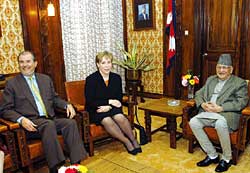 Immediately after landing in Kathmandu on Tuesday, US Assistant Secretary of State for South Asia, Christina Rocca said: "I am here to see what is going on in Nepal." By the time she leaves on Friday, it is unlikely that she will have learned much more than what she have already been told by the embassy here.
Immediately after landing in Kathmandu on Tuesday, US Assistant Secretary of State for South Asia, Christina Rocca said: "I am here to see what is going on in Nepal." By the time she leaves on Friday, it is unlikely that she will have learned much more than what she have already been told by the embassy here. Most people she met here has probably confirmed her worst fears and best hopes. The myth of a god-king and the stabilising role of a monarchy in a traditional society all need to be rethought in the post-royal massacre scenario and in the context of the anti-monarchist insurgency. The royal takeover of October Fourth did little to bolster the king's constitutional credentials. The American assumption that the monarchy is a force of stability in a kingdom torn by insurgency is its first fallacy.
A second mis-reading may be the role and responsibility of the Royal Nepali Army in counter-insurgency operations. The Nixon Doctrine of delegating such functions to "surrogate gendarmes" is long outdated. Strategists at Langley, who seem to have resurrected it to assign the RNA the role of a modernising agent, don't seem to be aware of the royalist antecedents of this force.
Unlike nationalist armies in other developing countries, the RNA never had to go through the transforming process of an anti-colonial struggle. It has always acted instead as an instrument of power exclusively in the hands of authoritarian rulers: Rana prime ministers before 1950 and the Shah kings thereafter.
Such a traditionalist focus is not conducive in making an army modern in outlook and in a technocratic orientation necessary to usher changes to Nepali society. Since it never had to prove itself and always relied on brute force, its hearts-and-minds actions have been largely inadequate. The RNA is ideologically ill-equipped to handle the challenges of an insurrection on its own. Eric Nordlinger in the American Political Science Review maintains that military establishments in developing countries are fundamentally unconcerned about social change and are opposed to groups who strive for reform.
The American foreign policy establishment has also harboured deep suspicion of our politicians. Popularly elected leaders are, by their very nature, less respectful towards foreigners and there is a dominant belief in the donor community that underdeveloped nations are underdeveloped because of their political immaturity, which is traceable to civilian politicians and their politicking.
This assumption is fundamentally flawed. Immaturity is a process of maturing that can't be wished away. It's often the most mature institution (the king in traditionalist societies, the party in post-communist states and the army in newly independent nations) that is the cause of political instability in emerging democracies.
The third fallacy in American policy towards Nepal is born out of the 'Brown Doctrine', named after former US Secretary of Defence Harold Brown who set forth the dictum: "Third World instability by itself, whatever the ideological orientation of the antagonists involved, is a threat to the existing world order and thus to US economic security."
The United States therefore supports the status quo in every country under its influence. In Nepal, where popular desire for change is so strong, it has put the Americans in the company of unyielding oligarchs. There is no way Madam Rocca would have apprised herself of the ground realities in Nepal by conversing with Messers Thapa, Thapa, Thapa and Thapa with a few Shah-Ranas thrown in.
The final fallacy is the readiness of the United States to impose its authority and supremacy around the world by military force, which has alarmed just about everyone. This has brought Washington into a head-on collision in Nepal with the Europeans who insist that above all else, human rights must be respected.
The Indians are bereft of ideological baggage, their interests are more pragmatic, all they want is to ensure the continuation of their dominance in Nepal. The Chinese aren't making a hue and cry, but their alarm at continued instability in Tibet's backyard isn't difficult to appreciate. It's hard for a state under such a close scrutiny of international and regional players to 'fail' abruptly. And to prevent that from happening, the centrality of the Nepalis themselves in all this must be restored. Outsiders must also mull over how their precarious balance of interests over Nepal doesn't turn into a bruising proxy fight.
Despite Nepal's poverty, it is not one of those banana republics that can be run with the assistance of a loyal sheriff. All Christina Rocca needs to take back home to correct her government's policies towards Nepal is an appreciation of the role of democracy in this country.



